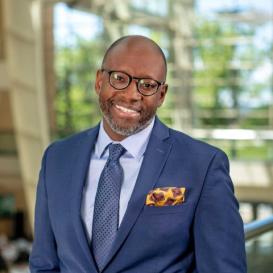Speaker
Anthony B. Bradley, PH.D.
Distinguished Research Fellow: Acton Institute

Anthony Bradley, Ph.D. is the Distinguished Research Fellow for the Acton Institute’s Research Dept. Dr. Bradley also serves as Research Professor of Interdisciplinary and Theological Studies at Kuyper College in Grand Rapids, Michigan. He holds Bachelor of Science in biological sciences from Clemson University, a Master of Divinity from Covenant Theological Seminary, a Masters in Ethics and Society from Fordham University, and a Doctor of Philosophy degree from Westminster Theological Seminary. As a research fellow, Dr. Bradley lectures at colleges, universities, business organizations, conferences, and churches throughout the U.S. and abroad. His writings on religious and cultural issues have been published in a variety of journals, including: the Philadelphia Inquirer, the Washington Examiner, the Atlanta Journal-Constitution, the Detroit News, Christianity Today, and World Magazine. Dr. Bradley is called upon by members of the broadcast media for comment on current issues and has appeared on NPR, CNN/Headline News, and Fox News, among others. He studies and writes on contemporary issues including mass incarceration and overcriminalization, trauma, addiction, youth and family, poverty, education, and social ethics. His dissertation explores the intersection of black liberation theology and economics. Previously, Dr. Bradley served as Professor of Religious Studies at The King’s College in New York City (2009-2023) and Assistant Professor of Systematic Theology and Ethics at Covenant Theological Seminary in St. Louis, MO where he also directed the Francis A. Schaeffer Institute. His books include: Liberating Black Theology (2010), Black and Tired (2011), The Political Economy of Liberation (2012), Keep Your Head Up (2012), Aliens In The Promised Land (2013), John Rawls and Christian Social Engagement (2014), Black Scholars In White Space (2015), Something Seems Strange (2016), Ending Overcriminalization and Mass Incarceration (2018), Faith In Society (2019), Why Black Lives Matter (2020), and Heroic Fraternities (2023).





